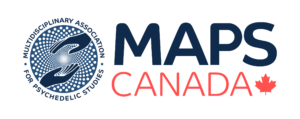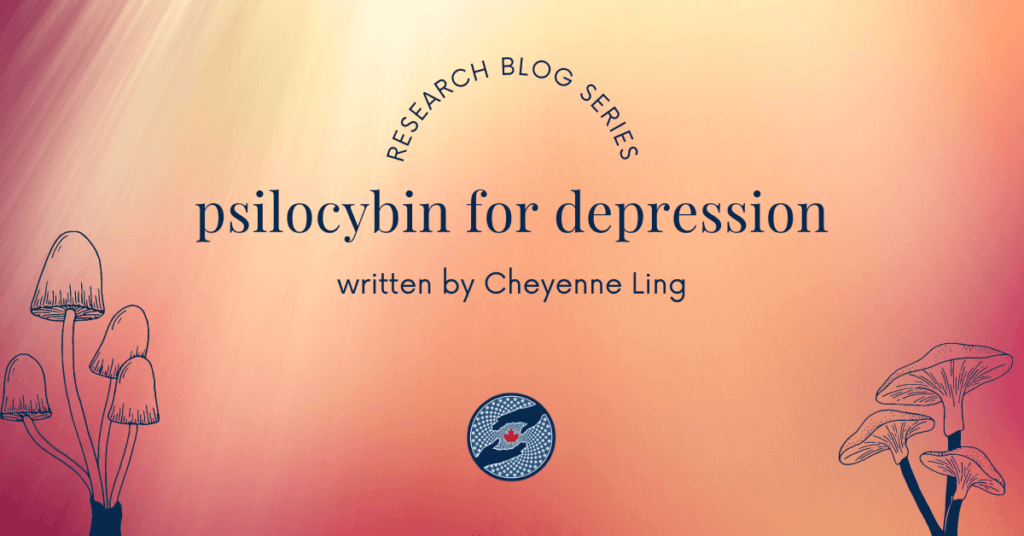Objective
The Center for Psychedelic and Consciousness Research at Johns Hopkins Medical school in Baltimore conducted a randomized, controlled clinical trial to examine if one or two administrations of psilocybin, in addition to psychological support, could be an effective treatment for patients suffering from major depressive disorder (MDD).
What is Major Depressive disorder?
Major depressive disorder is a crippling disease that affects more than 300 million individuals worldwide (Davis et al., 2020). Symptoms of MDD include diminished interest in activities, insomnia, fatigue, feelings of worthlessness and guilt, impaired cognitive function, and suicidal ideation persisting for prolonged periods (Otte et al., 2016).
Treatment for MDD typically includes pharmacotherapy in the form of selective serotonin reuptake inhibitors, also known as antidepressants. For some patients, these medications have proven to be effective. However, pharmacotherapy is limited in efficacy, with 30-50% of patients not completely responding to treatment and 10-30% of patients considered treatment-resistant, resulting in average effects that are only moderately larger than the placebo (Gaynes et al., 2009; Nemeroff, 2007). Additionally, these medications require daily administration and are known to result in adverse unwanted side effects. Major depressive disorder is a widespread public health concern, which requires new techniques that may offer rapid and sustained antidepressant treatment.
Why Psilocybin?
Psilocybin is a chemical found in several types of fungal species, such as Psilocybe cubensis, and Psilocybe cyanescens (Matsushima et al., 2009). In the brain, psilocybin manipulates the serotonergic and glutamatergic systems, creating hallucinogenic and entheogenic effects (Davis et al., 2020). It is known for its low physiological toxicity, and non-addictive properties (Lyons & Carhart-Harris, 2018). Growing evidence suggests psilocybin can promote rapid long-term reductions in symptoms of treatment-resistant depression, with as few as two treatments (Carhart-Harris et al., 2016; Ross et al., 2016).
Therefore, if two treatments of psilocybin accompanied by psychological support could promote quick, long-lasting recovery from MDD, this form of therapy would render a breakthrough in how we approach and treat this debilitating illness (Davis et al., 2020). Thus, Davis et al., (2020) sought to investigate the effects of two psilocybin psychotherapy sessions in patients with MDD.
Methods
Davis et al. (2020) used a randomized, waiting–list–controlled clinical trial. This means that patients were randomly assigned to each group, reducing the likelihood of biases that may confound the study’s results.
The groups consisted of an immediate and a delayed treatment group. The waiting list pertains to the delayed treatment group, which received psilocybin-assisted psychotherapy after an eight-week waiting period. The reason for this delayed treatment group was to differentiate the psilocybin treatment from spontaneous symptom improvement. Subsequently, allowing for more robust evidence to support that psilocybin was the reason for improvement and not simply time.
Screening
Participants were aged 21-75 years old and recruited through advertisements, social media and the study website. To avoid potential interactions and confounding effects, eligible participants reported no current use of antidepressant pharmacotherapy. Twenty-seven participants qualified and were randomized to the immediate or delayed group.
Psilocybin Session Description
Before the first psilocybin treatment were two preparatory meetings with session facilitators. Following these meetings, were two psilocybin sessions conducted 1.6 weeks apart. A moderately high psilocybin dose (20 mg/70 kg) was administered in session one, followed by a high psilocybin dose (30 mg/70 kg) in session two.
During the psilocybin sessions, two facilitators were present to offer psychological support. Participants lay on a couch wearing eyeshades and focused their attention inwards, enduring any inner experiences that surfaced.
Measurement
To quantify participants’ depression Davis et al.,(2020) administered the GRID-Hamilton Depression Rating Scale (GRID-HAMD). The initial administration of the GRID-HAMD took place at baseline (before psilocybin treatment). The subsequent measures occurred one week after and four weeks after the second psilocybin treatment. The scale used the following scores…
0-7: no depression; 8-16: mild depression; 17-23: moderate depression; ≥24: severe depression.
Results
A total of twenty-four participants completed the study. Thirteen participants were randomized to the immediate treatment group and eleven to the delayed treatment group.
At the first follow-up visit one week after the psilocybin treatment, 17 participants (71%) had a ≥50% reduction in their GRID- HAMD score. This same reduction of ≥50% in 17 participants’ depression rating persisted four weeks after the psilocybin intervention. In other words, compared to their score at baseline on the depression rating scale, 71% of participants’ depression scores decreased by greater than or equal to 50% at one and four weeks after treatment with psilocybin. Additionally, 14 participants (58%) one week after psilocybin treatment, and 13 participants (54%) four weeks after, obtained scores indicating remission of their depression (≤7 GRID-HAMD score).
As explained prior, the delayed group obtained psilocybin treatment eight weeks after the immediate group, controlling for spontaneous symptom improvement. Scores on the GRID-HAMD at weeks 1 and 4 and in the immediate treatment group were statistically significantly lower than scores at the comparable time points of weeks 5 and 8 in the delayed treatment group. Thus supporting that psilocybin treatment was the reason for improvements in depression and not just the passage of time.
Discussion
This randomized clinical trial illustrated the rapid and sustained effects of psilocybin-assisted therapy in patients suffering from MDD. The effect sizes obtained in this study were more than four times greater than the effect sizes found in psychopharmacological depression treatment studies (Davis et al., 2020). In other words, there is a much stronger relationship between psilocybin-psychotherapy and decreases in depression than there is with psychopharmacological treatments.
Personally relevant inner reflections and the potential for psilocybin to decrease negative affect are possible explanations for these rapid improvements in MDD. Moreover, psilocybin produced non-serious adverse side effects such as a headache that was limited to the time of the session. Therefore, this treatment may be more desirable when compared to antidepressant medications which generate persistent adverse side effects such as weight gain, fatigue and low libido (Davis et al., 2020).
Altogether, Davis et al., (2020) showed that as little as two sessions of psilocybin-assisted psychotherapy rapidly produces considerable antidepressant effects that are sustained long-term in people suffering from MDD.
References
Carhart-Harris, R. L., Bolstridge, M., Rucker, J., Day, C. M. J., Erritzoe, D., Kaelen, M.,
Bloomfield, M., Rickard, J. A., Forbes, B., Feilding, A., Taylor, D., Pilling, S., Curran, V.
H., & Nutt, D. J. (2016). Psilocybin with psychological support for treatment-resistant depression: an open-label feasibility study. The Lancet Psychiatry, 3, 619–627.
Davis, A. K., Barrett, F. S., May, D. G., Cosimano, M. P., Sepeda, N. D., Johnson, M. W., Finan, P. H., & Griffiths, R. R. (2020). Effects of Psilocybin-Assisted Therapy on Major Depressive Disorder: A Randomized Clinical Trial. JAMA Psychiatry. https://doi.org/10.1001/jamapsychiatry.2020.3285
Gaynes, B., Warden, D., Trivedi, M., Wisniewski, S., Fava, M., & Rush, A. (2009). What Did
STAR*D Teach Us? Results From a Large-Scale, Practical, Clinical Trial for Patients
With Depression. Psychiatric Services, 60(11), 1439-1445. doi: 10.1176/ps.2009.60.11.1439
Lyons, T., & Carhart-Harris, R. L. (2018). Increased nature relatedness and decreased authoritarian political views after psilocybin for treatment-resistant depression. Journal of Psychopharmacology, 32, 811–819.
Matsushima, Y., Eguchi, F., Kikukawa, T., & Matsuda, T. (2009). Historical overview of psychoactive mushrooms. Inflammation and Regeneration, 29, 47-58.
Nemeroff C. B. (2007). Prevalence and management of treatment-resistant depression. The
Journal of clinical psychiatry, 68 Suppl 8, 17–25.
Otte, C., Gold, S., Penninx, B., Pariante, C., Etkin, A., & Fava, M. et al. (2016). Major
depressive disorder. Nature Reviews Disease Primers, 2(1). doi: 10.1038/nrdp.2016.65
Ross, S., Bossis, A., Guss, J., Agin-Liebes, G., Malone, T., Cohen, B., Mennenga, S. E., Belser, A., Kalliontzi, K., Babb, J., Su, Z., Corby, P., & Schmidt, B. L. (2016). Rapid and sustained symptom reduction following psilocybin treatment for anxiety and depression in patients with life-threatening cancer: A randomized controlled trial. Journal of Psychopharmacology, 30, 1165–1180.


Please consider refraining from using the term “treatment resistant.” This is a marketing term employed by the pharmaceuticals to disguise the fact that antidepressants fail to work for many consumers. These consumers tried the drugs, and either the drugs’ side-effects were unacceptable, or the drugs had no efficacy.